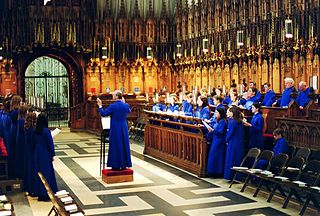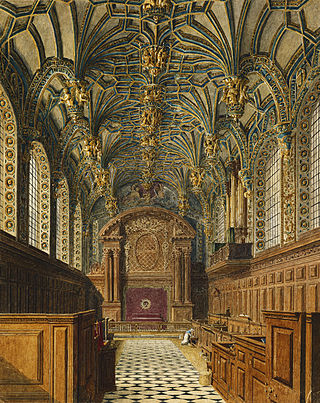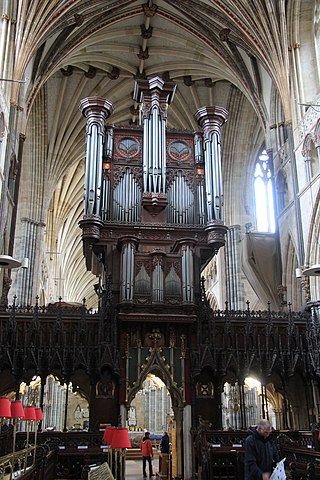
In Western classical music, a motet is mainly a vocal musical composition, of highly diverse form and style, from high medieval music to the present. The motet was one of the pre-eminent polyphonic forms of Renaissance music. According to Margaret Bent, "a piece of music in several parts with words" is as precise a definition of the motet as will serve from the 13th to the late 16th century and beyond. The late 13th-century theorist Johannes de Grocheo believed that the motet was "not to be celebrated in the presence of common people, because they do not notice its subtlety, nor are they delighted in hearing it, but in the presence of the educated and of those who are seeking out subtleties in the arts".

A choir is a musical ensemble of singers. Choral music, in turn, is the music written specifically for such an ensemble to perform. Choirs may perform music from the classical music repertoire, which spans from the medieval era to the present, or popular music repertoire. Most choirs are led by a conductor, who leads the performances with arm, hand, and facial gestures.

William Byrd was an English Renaissance composer. Considered among the greatest composers of the Renaissance, he had a profound influence on composers both from his native country and on the Continent. He is often considered along with John Dunstaple, Thomas Tallis and Henry Purcell as one of England's most important composers of early music.

Vespro della Beata Vergine, SV 206, is a musical setting by Claudio Monteverdi of the evening vespers on Marian feasts, scored for soloists, choirs, and orchestra. It is an ambitious work in scope and in its variety of style and scoring, and has a duration of around 90 minutes. Published in Venice as Sanctissimae Virgini Missa senis vocibus ac Vesperae pluribus decantandae, cum nonnullis sacris concentibus, ad Sacella sive Principum Cubicula accommodata, it is sometimes called Monteverdi's Vespers of 1610.

Orlando Gibbons was an English composer and keyboard player who was one of the last masters of the English Virginalist School and English Madrigal School. The best known member of a musical family dynasty, by the 1610s he was the leading composer and organist in England, with a career cut short by his sudden death in 1625. As a result, Gibbons's oeuvre was not as large as that of his contemporaries, like the elder William Byrd, but he made considerable contributions to many genres of his time. He is often seen as a transitional figure from the Renaissance to the Baroque periods.

John Weldon was an English composer.
Robert White probably born in Holborn, a district of London, was an English composer whose liturgical music to Latin texts is considered particularly fine. His surviving works include a setting of verses from Lamentations, and instrumental music for viols.
Edmund Hooper was an English composer and organist. He was employed at Westminster Abbey from 1588 to 1621 and organist of the Chapel Royal from 1618 to 1621.

William Mundy was a Renaissance English composer of sacred music and father of composer John Mundy. Over four hundred years after his death, William Mundy's music is still performed and recorded.

Adrian Batten was an English organist and Anglican church composer. He was active during an important period of English church music, between the Reformation and the English Civil War in the 1640s. During this period the liturgical music of the first generations of Anglicans began to diverge significantly from music on the continent. Among the genres developed during this period by Batten and other Anglican composers was the 'verse anthem', in which sections alternate between the full choir and soloists, underlain and unified by an independent organ accompaniment.

"This Is the Record of John" is a verse anthem written by the English composer Orlando Gibbons (1583–1625). It is based on a text from the Gospel of John in the Geneva Bible and is a characteristic Anglican-style composition of its time. "John" refers to John the Baptist. The piece is divided into three sections, each beginning with a verse for solo contratenor followed by a full section, echoing words of the verse. The singers are usually accompanied by organ: a viol consort is another possibility, although it is debatable how frequently viols would have been used in Jacobean services.

John Rutter's Requiem is a musical setting of parts of the Latin Requiem with added psalms and biblical verses in English, completed in 1985. It is scored for soprano, mixed choir and orchestra or chamber ensemble.
William Turner was a composer and countertenor of the Baroque era. A contemporary of John Blow and Henry Purcell, he is best remembered for his verse anthems, of which over forty survive. As a singer, he was a Gentleman of the Chapel Royal from 1669 until his death.

Psalm 47 is the 47th psalm of the Book of Psalms, beginning in English in the King James Version: "O clap your hands". The Book of Psalms is the third section of the Hebrew Bible, and a book of the Christian Old Testament. In the slightly different numbering system used in the Greek Septuagint and Latin Vulgate translations of the Bible, this psalm is Psalm 46. In Latin, it is known as "Omnes gentes plaudite manibus". The psalm is a hymn psalm. It is one of twelve psalms attributed to the sons of Korah, and one of fifty-five psalms addressed to the "Chief Musician" or "Conductor".
Psalm 86 is the 86th psalm of the Book of Psalms, beginning in English in the King James Version: "Bow down thine ear, O Lord, hear me: for I am poor and needy". In the slightly different numbering system used in the Greek Septuagint and Latin Vulgate translations of the Bible, this psalm is Psalm 85. In Latin, it is known as "Inclina Domine". It is attributed to David.

"Remember not, Lord, our offences", Z.50, is a five-part choral anthem by the English baroque composer Henry Purcell (1659–95). The anthem is a setting of a passage from the litany compiled by Thomas Cranmer, Archbishop of Canterbury, and later included in the Anglican Book of Common Prayer. It was composed circa 1679–82 at the beginning of Purcell's tenure as Organist and Master of the Choristers for Westminster Abbey.

O clap your hands is a motet by Ralph Vaughan Williams. He composed the anthem, a setting of verses from Psalm 47, in 1920 for a four-part choir, organ, brass, and percussion. He later also made versions for orchestra and for organ. The motet was often recorded.

I Will Mention the Loving-kindnesses is an anthem for Easter by Arthur Sullivan. The text is taken from the Book of Isaiah, scored for solo tenor, mixed choir and organ. It was published by Novello in 1875, dedicated to John Stainer.

Edward Gibbons was an English choirmaster and composer of the late Renaissance and early Baroque periods. Born in Cambridge, Gibbons's youth is completely unknown, but he later received degrees from the Universities of Cambridge and Oxford. From 1591/92 to 1598 he worked at King's College, Cambridge, as a lay clerk and choirmaster. During his tenure he married Jane, with whom he had six children. Gibbons's whereabouts the next few years remain uncertain; he may have lived in Acton, Bristol or Exeter, but by 1607 he was the choirmaster of the Exeter Cathedral, where the choristers included Matthew Locke. By 1609 Gibbons received a special dispensation to become a priest vicar, becoming the head of the college of priest-vicars and succentor. Jane died in 1628, and Edward married Mary Bluet; the family was evicted from their home during the English Civil War, but moved to their estate in Dunsford.













